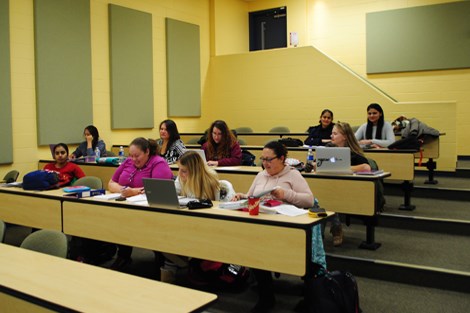Walking the halls of Northern College, you wouldn’t guess that anything was out of the ordinary, but it doesn’t take long to find students who admit there’s an undercurrent of anxiety amongst the student body.
Last Tuesday, college professors and students across Ontario returned to class after the provincial government passed back-to-work legislation to end the five-week strike that began on Oct. 16.
While tension on the picket lines has subsided, students at Northern College say they understand that the stressful times are far from over.
“There will be stricter deadlines for us . . . Not only will we the students be stressed but the faculty as well," said Lisa Bourgon Millar, a student in the Social Services Worker program.
With classes back in session, some students are already starting to feel hopeful.
“So far in the classes I’ve had, the teachers are trying to be as accommodating as possible,” said Scott Noonan, a student in the Police Foundations program. “Having only been back for a couple of days now, I do sense we’re already getting back into our groove.”
The Northern College Student Association held a Welcome Back Breakfast for the students on Tuesday morning.
“Some students were very uncertain and felt anxious about returning to class while others were happy and excited,” said NCSA President Taylor Purdy. “Holding this event was important to maintain the morale and motivation within the college and the student body.”
Not all students are feeling a sense of relief. Shaunacy Gelineau, another student in the Social Services Worker program, did not attend the breakfast.
“I don't want to or am not ready to indulge in the social aspects of college life when my academic grades are in jeopardy,” she said.
The stress of the strike took a particularly strong toll on Gelineau, who said she struggles with several mental illnesses.
"My mental health was and always will be a work in progress. As a student I make use of the accessibility center as well as the many other resources the school provides to help students. Since the strike I have found myself back into old routines that are not helpful to my mental health.”
Gelineau isn’t alone. Statistics provided by the Canadian Mental Health Association Cochrane-Temiskaming show that 34 per cent of Ontario students indicate a moderate-to-serious level of psychological distress, such as anxiety and depression, and 14 per cent indicate a serious level of psychological distress.
College President Fred Gibbons assures students that supports are and will continue to be available to students who need it.
“As students return to class we anticipate that anxiety levels will continue to remain high as they come to better understand our semester completion plan and the revised semester completion dates,” he said. “Northern College has an experienced team of student advisors at each of our campuses, in addition to the support of a mental health advisor who will work with our students to make their transition back to class as smooth as possible.”
Janice Stark, a mental health worker with the CMHA Cochrane-Timiskaming said she wants students to know that there are many resources available in the community. The local branch of the CMHA has a First Step office that offers crisis intervention, supportive counselling, and an information service.
The First Step office is open to the public from 8:30 a.m. to 4 p.m. Monday to Friday.
Students can also contact Good2Talk, a free, confidential helpline for post-secondary students in Ontario, which provides information and referrals about services and supports for mental health, addictions and wellbeing on and off campus. They can also speak anonymously with a professional counsellor by phone at 1-866-925-5454.
For Noonan, NCSA’s Welcome Back Breakfast was just what he needed to get back into his college routine. “It was a good way for us to relax and catch up with our peers before jumping back into school,” he said. “It really helped, not just by nulling the nerves and worry but also by boosting morale and really, by bringing the class back together again.”



